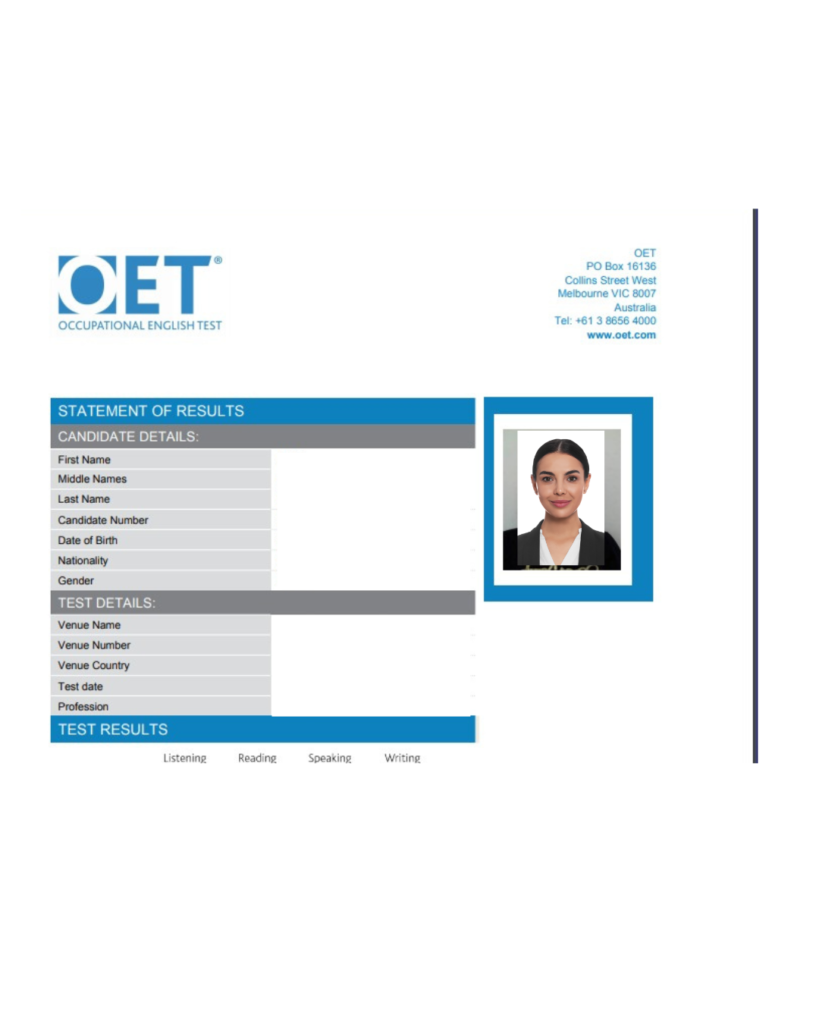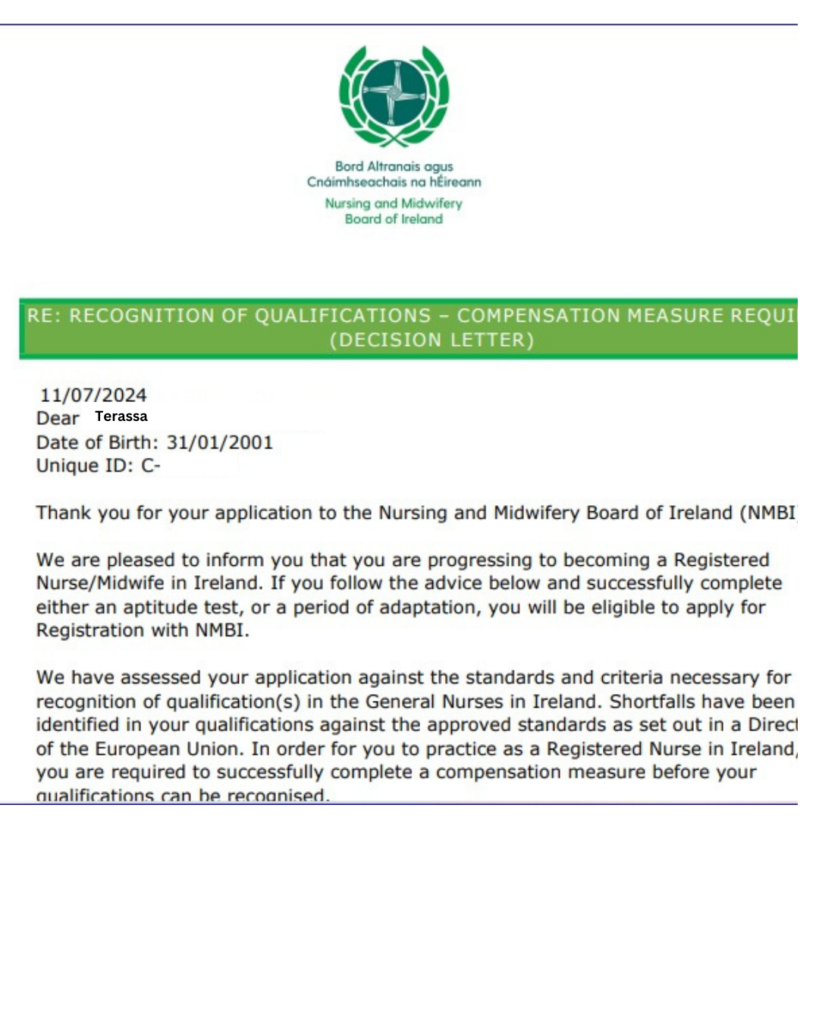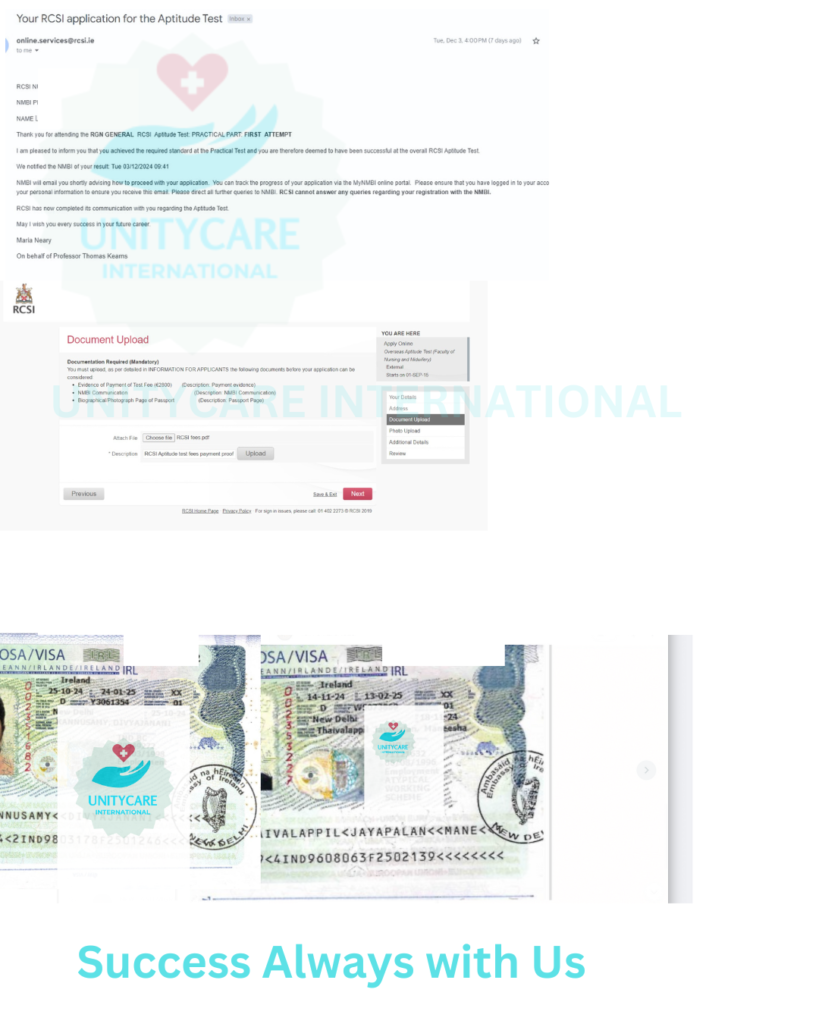Your Gateway to a Successful Nursing Career in Ireland
Occupational English Test (OET)
International English Language Testing System (IELTS)


OET is specifically designed for healthcare professionals.
Occupational English Test (OET)
Overview:
- OET is specifically designed for healthcare professionals.
- It assesses language skills in a healthcare context.
Sections:
- Listening: 45 minutes, divided into three parts (consultations, short workplace extracts, and a presentation).
- Reading: 60 minutes, divided into three parts (expedited reading tasks, reading for meaning, and reading for details).
- Writing: 45 minutes, usually involves writing a referral letter or similar professional correspondence.
- Speaking: 20 minutes, structured as role-plays related to your profession.
Steps to Complete OET:
- Registration: Book your test via the official OET website.
- Preparation: Use resources like practice tests and preparation courses.
- Exam Day: Attend the test center to complete all four sections.
- Results: Results are available online within 2-3 weeks after the test date.
Required Scores:
- Australia: Minimum grade of B (350-450) in all sections.
- Ireland: Same as Australia, a minimum grade of B (350-450) in all sections.
International English Language Testing System (IELTS)
Overview:
- IELTS is used for various purposes including academic, migration, and professional registration.
- It measures overall English language proficiency.
Sections:
- Listening: 30 minutes, with four recordings of native English speakers.
- Reading: 60 minutes, with three reading passages.
- Writing: 60 minutes, consisting of two tasks (a report/essay for academic IELTS).
- Speaking: 11-14 minutes, a face-to-face interview.
Steps to Complete IELTS:
- Registration: Book your test via the official IELTS website.
- Preparation: Utilize study guides, sample tests, and IELTS preparation courses.
- Exam Day: Complete all four sections at the test center.
- Results: Results are available within 2 weeks after the test date.
Required Scores for Nurses:
- Australia: Overall score of 7.0 with at least 7.0 in each component.
- Ireland: Similar to Australia, an overall score of 7.0 with at least 7.0 in each component.
Key Differences
- Focus: OET is healthcare-specific, while IELTS is general.
- Content: OET tasks are related to healthcare scenarios, making it more relevant for medical professionals.
- Recognition: Both tests are widely recognized, but some employers or regulatory bodies might prefer one over the other based on the specific role.
Advantages of Each Test
OET:
- Tailored to healthcare professionals, which may make it easier to relate to and prepare for.
- Focuses on real-world medical scenarios.
IELTS:
- More versatile and accepted for a variety of purposes beyond healthcare.
- General English skills assessment can be useful in multiple contexts.
Registration and Preparation Tips
- Choose the Right Test: Consider your career goals and the requirements of your target country or employer.
- Practice Regularly: Use practice tests to get familiar with the format and types of questions.
- Improve Your English: Focus on all four language skills (listening, reading, writing, and speaking).
- Take Preparation Courses: Enroll in courses specifically designed for OET or IELTS.
- Stay Calm and Confident: On the day of the test, stay relaxed and confident in your abilities.
DECISION LETTER

1. Gather Documentation:
Arrange all necessary documents, including proof of qualifications, professional experience, identification, and English language competence.
2. Submit Application: Apply online through the Unitycare International. Submit all required documents, including notarized copies and translations if needed
3. Assessment: NMBI will assess your application, which may include a compensation measure such as an aptitude test or a period of adaptation if there are gaps in your qualifications.
4. Decision Letter: You will receive a decision letter by email or post, informing you of the outcome of your application
RCSI

1. Obtain an Decision Letter: Ensure you have an in-date decision letter from the Nursing and Midwifery Board of Ireland stating that you need to complete a compensation measure, such as the RCSI Aptitude Test.
2. Complete the Online Application: Unitycare International will complete the online application form for the Overseas Aptitude Test. You will need to upload four documents with your application: o NMBI decision letter o Proof of professional experience o Proof of qualifications o Proof of English language competence
3. Submit the Application: Once your application is submitted, RCSI will review it and send you a confirmation email with an invitation to the test.Next RCSI exam date check above
4. Prepare for the Test: Familiarize yourself with the test format and content. The test comprises two parts: a theory (MCQ) test and a practical (OSCE) test5. The theory test must be completed before attempting the practical test.
5. Receive Test Details: You will receive further information about the test, including the date, time, and location, approximately 17 days before the test date
6. Receive Invitation
Documents
Your NMBI Decision Letter
Proof Of payment for the exam fee
Other Documents Specified By RCSI
STATIONS
Station Details for the Practical Test (OSCE)
Hand Hygiene: Demonstrate correct hand washing techniques and explain the importance of hand hygiene in preventing infections.
Patient Assessment: Conduct a comprehensive assessment of a patient, including taking vital signs and asking relevant health history questions.
Medication Administration: Show proper procedures for administering medications, including dosage calculation and confirming patient identity.
Wound Care: Demonstrate how to clean and dress a wound, including assessing the wound for signs of infection.
Infection Control: Apply principles of infection control in various scenarios, such as using personal protective equipment correctly.
Communication Skills: Display effective communication techniques with patients, family members, and colleagues
Emergency Response: Perform a basic emergency response, such as CPR or managing an airway obstruction.
Documentation: Accurately record patient information and care provided in a patient's medical record.
Patient Education: Educate a patient about managing a chronic condition or post-discharge care instructions.
Clinical Calculations: Solve clinical calculations, such as drug dosages and IV drip rates, accurately.
Ethical and Legal Considerations: Address scenarios involving ethical and legal considerations in nursing practice.
Pain Management: Assess and manage a patient's pain, including using pain assessment tools and non-pharmacological interventions.
Patient Safety: Identify and implement measures to ensure patient safety in different clinical situations.
Discharge Planning: Plan for a patient's discharge, ensuring continuity of care and arranging necessary follow-up.Next RCSI Date check Above
we will provide all stations Training
Patient Assessment: Conduct a comprehensive assessment of a patient, including taking vital signs and asking relevant health history questions.
Medication Administration: Show proper procedures for administering medications, including dosage calculation and confirming patient identity.
Wound Care: Demonstrate how to clean and dress a wound, including assessing the wound for signs of infection.
Infection Control: Apply principles of infection control in various scenarios, such as using personal protective equipment correctly.
Communication Skills: Display effective communication techniques with patients, family members, and colleagues
Emergency Response: Perform a basic emergency response, such as CPR or managing an airway obstruction.
Documentation: Accurately record patient information and care provided in a patient's medical record.
Patient Education: Educate a patient about managing a chronic condition or post-discharge care instructions.
Clinical Calculations: Solve clinical calculations, such as drug dosages and IV drip rates, accurately.
Ethical and Legal Considerations: Address scenarios involving ethical and legal considerations in nursing practice.
Pain Management: Assess and manage a patient's pain, including using pain assessment tools and non-pharmacological interventions.
Patient Safety: Identify and implement measures to ensure patient safety in different clinical situations.
